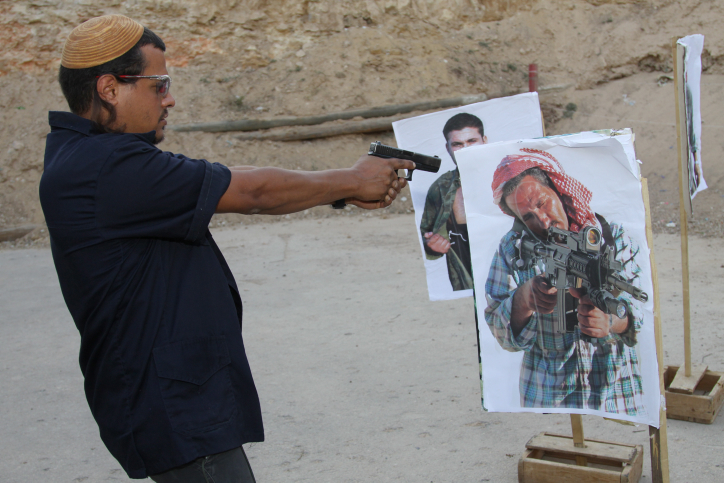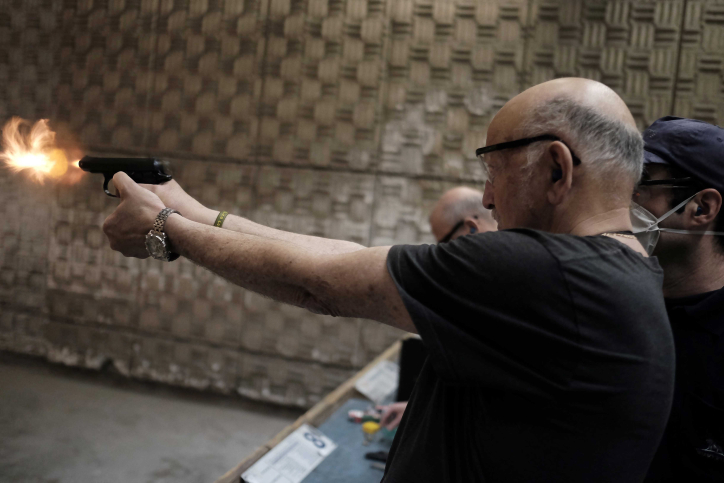Over the past few years, Public Security Minister Gilad Erdan has been gradually making it easier for average Israelis to obtain gun licenses. But instead of increasing security, it will only put more people, especially women, at risk.
By Rela Mazali

Israel’s newspapers have recently reported that tens or perhaps hundreds of thousands of previously ineligible Israeli citizens will now be eligible to apply for gun licenses. This may sound familiar. Haven’t we already heard about Gilad Erdan’s “gun for every person” plan? Why is it, once again, making headlines?
Erdan has been promoting his plan to hand out guns since commencing his term as public security minister. And every single time, his plan is presented as a fresh innovation. The first time we heard about it was in October 2015, “in the wake of a wave of terrorist attacks, the minister issued an order easing up on getting a gun license.” Months later, the media reported that Erdan was easing restrictions on armed security guards, claiming that allowing them to bear arms after their work shifts would help stop attacks.
In March 2016, the Knesset decided that “due to the security situation, security guards will be allowed to carry weapons outside their places of work.” In October 2017, in response to a potential reconciliation agreement between Fatah and Hamas, Erdan announced that he would encourage Israeli citizens to carry firearms in order to “provide better personal security.” Then in July of this year, the media reported that Erdan was making progress, and that he was planning on encouraging thousands of citizens to carry guns, and that every citizen who has undergone military combat training would be eligible to obtain a license. Now, in mid-August, Erdan has announced that he approved yet another reform for distributing guns to citizens.
But what Erdan refrained from making public this entire time was, for example, that zero attacks by Palestinians against Israeli civilians were stopped by off-duty security guards at the height of the period of attacks (October-December 2015). According to the “Gun Free Kitchen Tables” campaign, over that period, security guards opened fire in less than eight percent of attacks. But we didn’t hear that, nor the fact that those guards were on duty in every single case.
The Israeli media did, in fact, report on one of these cases, in which a security guard shot an innocent civilian, Habtom Zarhum, an Eritrean asylum seeker. But true to the minister’s line, we hardly heard about the fact that the IDF’s GOC Army Headquarters declared a “relatively calm period” and reversed the policy with severe restrictions on carrying personal weapons on army bases.
Meanwhile, Erdan did not provide comment to the press on the fact that his decision to allow security guards to take their guns homes has already claimed the lives of two people in two years. Before Erdan’s term, security guards were barred from bringing their guns home after their shift, and their weapons were collected and stored at work. Enforcement of this prohibition put an end to 11 straight years in which an average of three people was killed a year by off-duty guns. The majority of victims were women, in keeping with findings across the world showing that guns in homes are endanger women disproportionately.

What we are seeing is a classic re-branding campaign by Erdan to present himself as a tough and “masculine” political leader. Short, catchy slogans that ignore the facts and are repeated so many times that they themselves become “well-known facts” identified with the person repeating them.
Still, how is it that Erdan’s initiatives are trumpeted time and again as new and important? We are witnessing three parallel but connected processes, which Erdan is making the very most of. To some extent, they’re taking place below the radar, but Erdan decides when he wants another feather in his cap, and when to publicize the authority he wields to significantly influence the small arms proliferation in public space.
Though the minister’s plan is apparently driven by political and PR considerations, the resulting arming of the civil sphere is entirely real. As in other countries, the accelerated proliferation of guns increases the incidence of robberies, murders, rapes, and suicides. It is a bad omen for the personal security of all of us.
Three paths to proliferation
The change in policy is taking place on three levels: changing the law; “amending” the regulations that accompany the law; and making a series of decisions under the ministerial authority to carry out the law. According to “Gun Free Kitchen Tables,” an initiative of 13 women’s groups and civil society organizations working to tighten gun control and reduce small arms distribution, this comprehensive policy is disastrous.
The first level is gradual and slow, and has hardly been covered by the media. For the past few years — before Erdan became public security minister — and even more so today, the Knesset has been working on a sweeping new gun law to replace the existing one. The decision to reformulate the law was originally meant to minimize proliferation and tighten oversight and gun control. This approach prevailed for well over a decade throughout the terms of several governments.
On the other hand, the bill now being formulated under Erdan focuses on anchoring the proliferation of weapons in law while retreating further from government and organizational accountability. This 90-page bill was tabled in November 2017; the Knesset Internal Affairs and Environment Committee will formulate a final version, which will then be discussed in the Knesset.

The second level on which policy change is being carried out is a process of rewriting Israel’s “weapons regulations,” through which the Interior Affairs and Environment Committee translates the letter of the law into practical details. Along this independent track, based on the existing law, Erdan and the members of the committee have led significant changes in the regulations. For example, they have redefined the requirements for each licensee. On this track, the committee seriously diluted the basic requirements proposed by the police in consultation with the Ministry of Public Security.
The committee claimed that these consistently loosened requirements were necessary so as to reduce the “bureaucratic cost” imposed on licensed arms carriers. As a result, gun owners, described by the police representative to the committee as “endangering public safety, himself and his surroundings,” are not even subject to mandatory shooting-range practice once a year. These weak regulations have been marketed as a significant improvement, enhancing training and ensuring skilled gun carriers.
The third level on which Erdan is paving the way for much increased gun distribution — the one most focused on in his PR campaign and by media — is the broad discretion granted him by the gun law. This includes, for example, decisions on threshold conditions for applying for a gun license. Since entering office, Erdan has made and published a number of decisions that significantly enlarge the circle of eligibility.
In May 2016, the Public Security Ministry admitted the introduction of an additional 22,000 private weapons into the public sphere, and another 84,000 “organizational weapons,” owned and used by security companies, commercial firms, and municipal authorities authorized to store and deploy arms. Organizational arms carried by employees and residents are present civilian areas throughout the country and add far more than 100,000 guns to the 145,000 private guns repeatedly cited by the minister and his supporters. And that does not even consider the large number of weapons carried outside of military and police bases and storehouses by members of Israel’s security forces.
The proliferation of weapons in the public sphere, along with the continued calm in attacks on civilians, raise serious questions about the reasons and justifications behind the minister’s arms-distribution campaign. What is undeniable is the fact that these weapons will, in the future, lead to disasters made possible by their very presence. That is, preventable disasters.
Rela Mazali, a writer, an independent scholar and a feminist activist, is one of the leaders of Gun Free Kitchen Tables. This article was first published in Hebrew on Local Call. Read it here.
